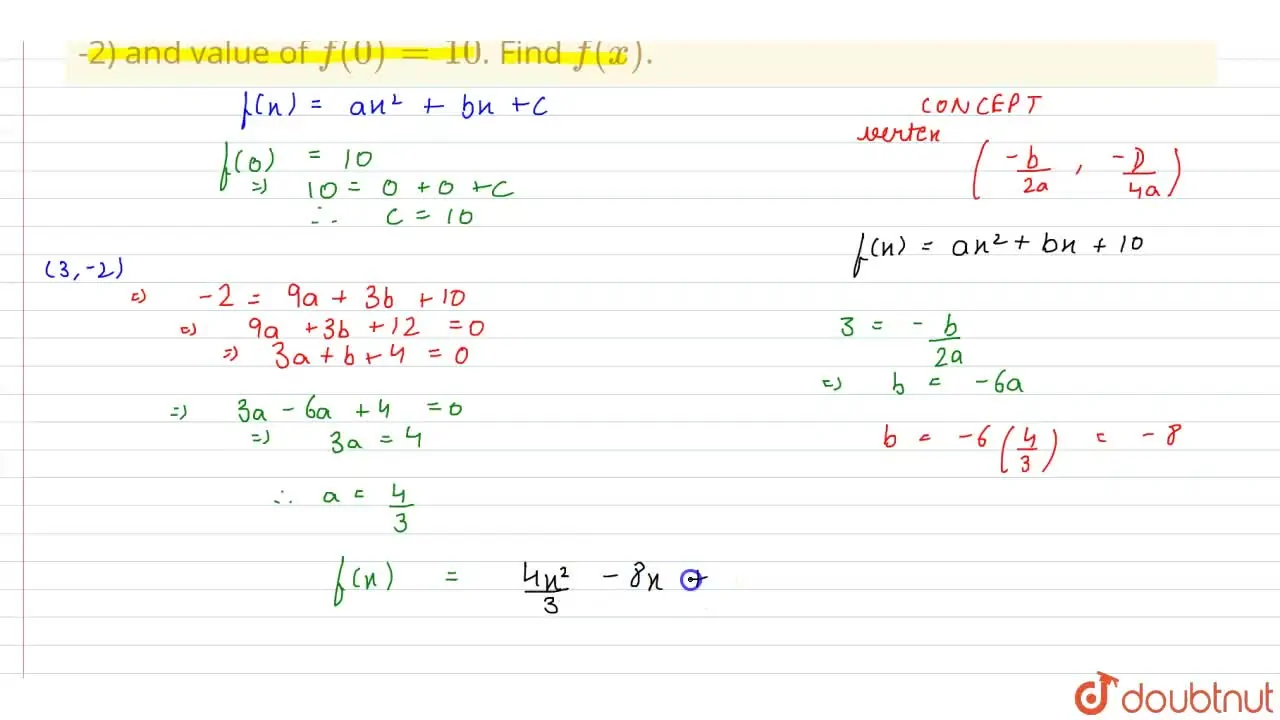Let f(x)=ax2+bx+c be a quadratic expression having its vertex at (3, -2) and value of f(0)=10. Find f(x).
f(x)=ax2+bx+c
Vertex ≡(−b2a,−D4a)
⇒−b2a=3 (1)
and −(b2−4ac)4a=−2 (2)
From (2), we get
−b24a+10=−2[∵c=f(0)=10]
or −b2a×b2=−12
or 3b2=−12
or b=−8
⇒a=43
⇒f(x)=43x2−8x+10
Related Playlists
- BOOK - CENGAGE ENGLISHCHAPTER - THEORY OF EQUATIONSEXERCISE - SOLVED EXAMPLES14videos
THEORY OF EQUATIONS
- BOOK - CENGAGE ENGLISHCHAPTER - THEORY OF EQUATIONSEXERCISE - CONCEPT APPLICATION EXERCISE 2.13videos
THEORY OF EQUATIONS
- BOOK - CENGAGE ENGLISHCHAPTER - THEORY OF EQUATIONSEXERCISE - Multiple Correct Answer6videos
THEORY OF EQUATIONS
- BOOK - CENGAGE ENGLISHCHAPTER - STRAIGHT LINESEXERCISE - ARCHIVES (NUMERICAL VALUE TYPE)1videos
STRAIGHT LINES
- BOOK - CENGAGE ENGLISHCHAPTER - THREE DIMENSIONAL GEOMETRYEXERCISE - All Questions294videos
THREE DIMENSIONAL GEOMETRY
Similar Questions
Let y=ax2+bx+c be a quadratic expression having its vertex at (3,-2) and value of c = 10, then Value of 'b' is equal to
View SolutionLet f(x) be a quadratic expression such that f(−1)+f(2)=0. If one root of f(x)=0 is 3, then the other root of f(x)=0 lies in (A) (−∞,−3) (B) (−3,∞) (C) (0,5) (D) (5,∞)
View SolutionIf f(x)=ax2+bx+c is a quadratic function such that f(1)=8,f(2)=11 and f(−3)=6 find f(x) by using determinants. Also, find f(0).
View SolutionLet f(x) be a quadratic expression which is positive for all real x and g(x)=f(x)+f'(x)+f''(x).A quadratic expression f(x) has same sign as that coefficient of x2 for all realx if and only if the roots of the corresponding equation f(x)=0 are imaginary.Which of the following holds true? (A) g(0)g(1)<0 (B) g(0)g(−1)<0 (C) g(0)f(1)f(2)>0 (D) f(0)f(1)f(2)<0
View SolutionLet f(x)=x3−3x2+2x Find f'(x)
View SolutionLet f(x)=x2+bx+c∀∈R,(b,c,∈R) attains its least value at x=−1 and the graph of f(x) cuts y-axis at y=2.
The value of f(−2)+f(0)+f(1)=View SolutionIf f′(x)=3x2−2x3 and f(1)=0 , find f(x) .
View SolutionLet f(x)=a2+bx+c where a ,b , c in Randa≠0. It is known that f(5)=−3f(2) and that 3 is a root of f(x)=0. Then find the other of f(x)=0.
View SolutionLet f be a real valued function defined by f(x)=x2+1. Find f'(2).
View SolutionLet f(x)=4x2−4ax+a2−2a+2 be a quadratic polynomial in x,a be any real number. If x-coordinate of vertex of parabola y =f(x) is less than 0 and f(x) has minimum value 3 for x∈[0,2] then value of a is (a) 1+√2 (b) 1−√2 (c) 1−√3 (d) 1+√3
View Solution


